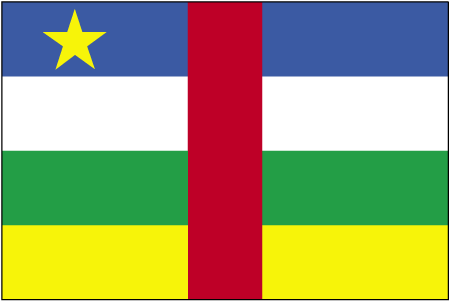Amid limited Internet access, Facebook remains popular in Central African Republic
Central African Republic has certainly made headlines in recent days. Despite the present conflict, the Internet is gradually making in-roads across Centrafrique. The key word here is gradually. Mobile subscriber growth is strong, but subscription rates are still less than 50%. Mobile Internet is still slow (non-3G) and there is heavy reliance on cyber cafés for access. Facebook still heavily overshadows entrepreneurship and app development, too.
As we reported in November 2011, Internet penetration rates in CAR aren’t necessarily the worst in Africa, but they suggest an early stage of Internet usage. Most users are concentrated in Bangui. A handful of bloggers cover social and political events in CAR as they happen. Many other people send emails, access Facebook, and read the news online. Freedom of the press is greatly lacking. There are no plans to launch 3G services. Unless we are mistaken, there is no core tech community in Bangui. Entrepreneurship is certainly not common and there seem to be essentially no web developers living in CAR.
Most Internet users, especially students, are hyper-focused on Facebook. Blogger Hippolyte Donossio says it best in a July 2012 post:
Le soir, les cybers café sont remplis. Un coup d’œil sur les écrans, montrent que 9 utilisateurs sur 10 sont sur Facebook.”
That is, on a typical evening, a glance at computer screens in a cyber café finds that 9 out of 10 users are on Facebook. We’ve found the following developments and notes from the past year (both good and not-so-good):
- The $26 million Central African Backbone fibre optic infrastructure project (supported by the World Bank) will connect CAR to Cameroon in 2013
- Geographically, half of CAR is covered by a mobile signal
- To combat the high rate of child labor in CAR, the Centre pour la Promotion et la Défense des droits de l’Enfant en RCA created a blog and a Twitter account
- According to a 2012 annual report from ITU, CAR leads only Niger and Chad in terms of overall ICT development
- Humanitarian Crisis Map for the Central African Republic launched in June 2012. The Ushahidi-powered map enables better information sharing between humanitarian agencies and local communities
- The Association of Journalists for Human Rights in Central African Republic uses mobile phones and Internet connections to link community radio stations and community correspondents
- A December 2011 policy dialogue on the integration of ICT in the CAR education system found many teachers do not know how to use computers to improve the content of their lessons. Also, the lack of power and the cost of hardware are difficult issues to solve
- A May 2012 article in Le Confident mentions how Telecel Central is modernizing its offerings, but mentions little about the Internet
- Johnny Bissakonou Vianney, author of the ‘Echoes from Central’ blog, wrote an instructional post on online dating earlier this year. Through his words, we learn that web users in CAR are aware of spammers and scammers. Johnny spent a couple of weeks as an Internet cafe monitor, where he found a large share of users to be focused on finding women online
- Hippolyte Donossio, a blogger in Bangui, wrote an excellent post on how youth stayed connected during Central holiday leave. One student feels he must stay connected with his friends at all times. Another student used the break to learn about social networks as to not face ridicule from his friends on his lack of Facebook skills. Many students do not have Internet-ready phones and many homes do not subscribe to Internet service. Still, many students appear to have no problem finding or affording the Internet.
Statistics suggest low Internet penetration rates and an affinity for Facebook:
- Geographically, half of CAR is covered by a mobile signal
- Mobile penetration stood at 19% per Orascom’s Q2 2012 earnings release
- President François Bozize had 3,560 Facebook fans in July 2012. He now has 3,508.
- StatCounter found iOS (Apple OS) to have a 20% mobile OS share in CAR in May 2012. iPhone 4S has been available in CAR since January 2012
- 4G wireless services (2.5 GHz wireless broadband) are live in Bangui. A press release from Airspan Networks cites 2% Internet penetration in CAR
- By the end of 2010, there were fewer than 800 Internet service customers, or one subscriber for every 6,000 inhabitants. At the same time, there were 1.2 million mobile customers with 132,000 having used mobile multimedia services at some point
- CAR experienced 4,000% growth in Facebook users from June 2010 to December 2011. As of December 31, 2012, there were an estimated 163,780 Facebook users in CAR. The assumption here is that nearly every Internet user is also a Facebook user
- The telecommunications regulator body, Agence de Régulation des Télécommunications (ART), planned on releasing quarterly statistics of the telecoms market starting in 2010, but no updates have been seen since later that year
Assuming the Central African Republic remains free of violence there is hope that 2013 will usher in greater levels of digital content creation. With a distracted government, it will be mostly up to the private sector to take the lead in stimulating innovation.













 Twitter
Twitter Facebook
Facebook Pinterest
Pinterest
Hopefully internet access in the country will reach 25% by the end of this decade. Penetration is much higher in India. Lifespan in CAR is only averaging 48 years. Much improvements need to be made in the CAR.